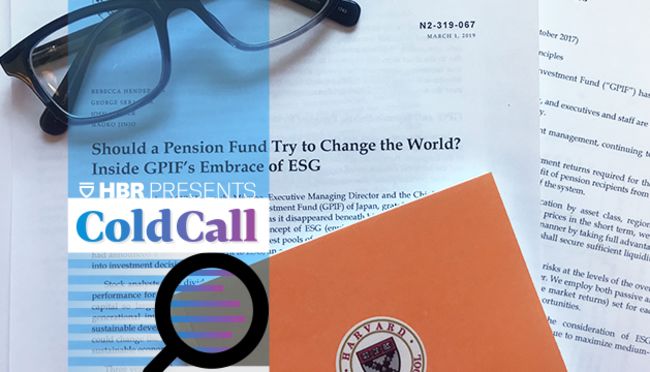Corporate Governance →
→

- 06 Jun 2023
- Cold Call Podcast
The Opioid Crisis, CEO Pay, and Shareholder Activism
In 2020, AmerisourceBergen Corporation, a Fortune 50 company in the drug distribution industry, agreed to settle thousands of lawsuits filed nationwide against the company for its opioid distribution practices, which critics alleged had contributed to the opioid crisis in the US. The $6.6 billion global settlement caused a net loss larger than the cumulative net income earned during the tenure of the company’s CEO, which began in 2011. In addition, AmerisourceBergen’s legal and financial troubles were accompanied by shareholder demands aimed at driving corporate governance changes in companies in the opioid supply chain. Determined to hold the company’s leadership accountable, the shareholders launched a campaign in early 2021 to reject the pay packages of executives. Should the board reduce the executives’ pay, as of means of improving accountability? Or does punishing the AmerisourceBergen executives for paying the settlement ignore the larger issue of a business’s responsibility to society? Harvard Business School professor Suraj Srinivasan discusses executive compensation and shareholder activism in the context of the US opioid crisis in his case, “The Opioid Settlement and Controversy Over CEO Pay at AmerisourceBergen.”

- 17 Jan 2023
- Cold Call Podcast
Nestlé’s KitKat Diplomacy: Neutrality vs. Shared Value
In February 2022, Russia invaded Ukraine, and multinational companies began pulling out of Russia, in response. At Switzerland-based Nestlé, chief executive Mark Schneider had a difficult decision to make. Nestlé had a long tradition of neutrality that enabled it to operate in countries regardless of their political systems and human rights policies. But more recently the company had embraced Michael Porter’s “shared value” paradigm, which argues that companies have a responsibility to improve the business community and the health of their communities. What should Schneider do? Professor Geoffrey Jones discusses the viability of the shared value concept and the social responsibility of transnational corporations today in the case, “Nestlé, Shared Value and Kit Kat Diplomacy.”

- 04 Oct 2022
- Cold Call Podcast
Cold Call: Corporate Governance and Growth Strategy at Capital SAFI
Jorge Quintanilla Nielsen started the independent asset management firm Capital SAFI in 2007. Now a leader in Bolivia’s closed-end funds industry with a total of $430 million in assets under management, Quintanilla planned to expand into other countries, like Peru and Colombia. He knew that governance would be one of the main aspects potential partners would evaluate. Capital SAFI’s board had evolved over time with the establishment of a governance committee, an assessment process for the board, professional development offerings for board members, tools to manage governance risk, and succession plans for board members and company executives. Would local and foreign investors be impressed by those measures or were additional improvements needed? Professor V. G. Narayanan discusses the importance of corporate governance in his case, “Building the Governance to Take Capital SAFI to the Next Level.”

- 19 Apr 2022
- Cold Call Podcast
What Role Do Individual Leaders Play in Corporate Governance?
From 1997 to 2012, Scott Tucker built a nationwide network of payday lending businesses, becoming a pioneer in online lending along the way. Many of his borrowers could not access credit from commercial banks and depended on payday loans as a financial lifeline to cope with emergency expenses. But in 2012 federal prosecutors indicted Tucker on several criminal charges that he violated disclosure requirements. He was later convicted on 14 charges, including racketeering, misleading disclosures, and fraud. Associate Professor Aiyesha Dey discusses how the case, “Scott Tucker: Race to the Top,” examines the role of individual leaders in the corporate governance system, as well as their responsibility for creating a positive corporate culture that embodies ethics, self-restraint, and a commitment to serve. Open for comment; 0 Comments.

- 04 Apr 2022
- What Do You Think?
As Disney Board Chair, What Would You Advise CEO Bob Chapek Regarding 'Don’t Say Gay'?
Disney started the year off strong—until a controversial new law in Florida set off a public firestorm. What guidance should Disney Chairman Susan Arnold provide to Bob Chapek? asks James Heskett. Open for comment; 0 Comments.

- 30 Nov 2020
- Working Paper Summaries
Short-Termism, Shareholder Payouts, and Investment in the EU
Shareholder-driven “short-termism,” as evidenced by increasing payouts to shareholders, is said to impede long-term investment in EU public firms. But a deep dive into the data reveals a different story.

- 13 Nov 2020
- Working Paper Summaries
The European Commission’s Sustainable Corporate Governance Report: A Critique
The European Commission commissioned a report on sustainable corporate governance that purports to find serious problems of corporate short-termism. The report is wholly flawed: it conflates time horizon problems with externality problems, mismeasures investment and its financing, and proposes ineffective, possibly harmful reforms.

- 13 Nov 2019
- Working Paper Summaries
Shareholder Activism and Firms’ Voluntary Disclosure of Climate Change Risks
Shareholder resolutions typically fail, and often by a wide margin. So why do active investors bother? It turns out that resolutions nonetheless can influence corporate transparency. Specifically, after being targeted with shareholder resolutions on environmental topics, this research shows that companies are more likely to publicly disclose their climate change risks—and that such disclosure increases these companies’ valuation.
- 02 Oct 2019
- What Do You Think?
What Grade Would You Give Walmart CEO Doug McMillon?
SUMMING UP: James Heskett's readers gave Walmart high marks for its response to gun violence but suggested the company could have been even more proactive. Open for comment; 0 Comments.

- 20 Aug 2019
- Cold Call Podcast
Should a Pension Fund Try to Change the World?
Can inclusivity, sustainability, and better governance boost economies? Rebecca Henderson and George Serafeim discuss the impact investing efforts of GPIF, Japan’s government pension fund. Open for comment; 0 Comments.

- 03 Jan 2019
- Research & Ideas
Everyone Knows Innovation is Essential to Business Success—Except Board Directors
In a recent survey of 5,000 board members, innovation was not ranked high on their list of priorities. What are they not seeing? ask Boris Groysberg and Yo-Jud Cheng. Open for comment; 0 Comments.

- 01 Nov 2017
- What Do You Think?
What Are the Real Lessons of the Wells Fargo Case?
SUMMING UP James Heskett's readers identify key failures in Wells Fargo's culture and leadership. Open for comment; 0 Comments.

- 31 Oct 2017
- Op-Ed
Op-Ed: In Tackling #MeToo, Don’t Ignore Micro-Insults That Harm Women’s Careers
The #MeToo movement is giving women power to speak out against sexual harassment, but Rosabeth Moss Kanter worries about less visible, but still harmful, "micro-insults" that undermine careers of women. Open for comment; 0 Comments.

- 14 Sep 2017
- Op-Ed
Op-Ed: Google Engineer Deserved to be Fired by the CEO
Was Google CEO Sundar Pichai right to fire engineer James Damore after his condemnation of the company's diversity initiatives? Of course, answers Bill George; treating colleagues as gender stereotypes rather than as individuals poisons the workplace. Open for comment; 0 Comments.

- 06 Sep 2017
- What Do You Think?
Summing Up: What Are the Limits of CEO Activism?
Do CEOs have a responsibility to speak out when they encounter social injustice? James Heskett's readers offer a variety of viewpoints. Open for comment; 0 Comments.

- 07 Aug 2017
- Working Paper Summaries
Governance Through Shame and Aspiration: Index Creation and Corporate Behavior in Japan
By exploiting the unique features of Japan’s JPX-Nikkei 400 index, this paper examines how membership in a stock index serves as a source of prestige that can motivate managers and influence corporate governance norms. Findings are important for understanding non-pecuniary mechanisms to induce meaningful changes in corporate behavior.

- 31 May 2017
- Working Paper Summaries
Stock Price Synchronicity and Material Sustainability Information
This paper seeks to understand and provide evidence on the characteristics of emerging accounting standards for sustainability information. Given that a large number of institutional investors seek sustainability data and have committed to using it, it is increasingly important to develop a robust accounting infrastructure for the reporting of such information.
- 09 May 2017
- What Do You Think?
Should Management Be Primarily Responsible to Shareholders?
SUMMING UP Opinions among James Heskett's readers are divided over a critical corporate governance question: Should management put the shorter-term interests of shareholders over the longer-term needs of the company? Open for comment; 0 Comments.

- 02 Nov 2016
- Working Paper Summaries
The Structure of Board Committees
Despite the central role of boards in corporate governance, there has been relatively little understanding of their internal organization, specifically the structure of board committees. Using a dataset of over 6,000 firms, the authors find that committee activity, especially the number of committees, has been stable over time. Most of the familiar non-required board committees are rarely used. The majority of directors sit on multiple committees. The benefits and costs of a committee depend on its type. Overall, committees need to be more integrated into our understanding of corporate governance.

Are Companies Getting Away with 'Cheap Talk' on Climate Goals?
Many companies set emissions targets with great fanfare—and never meet them, says research by Shirley Lu and colleagues. But what if investors held businesses accountable for achieving their climate plans?